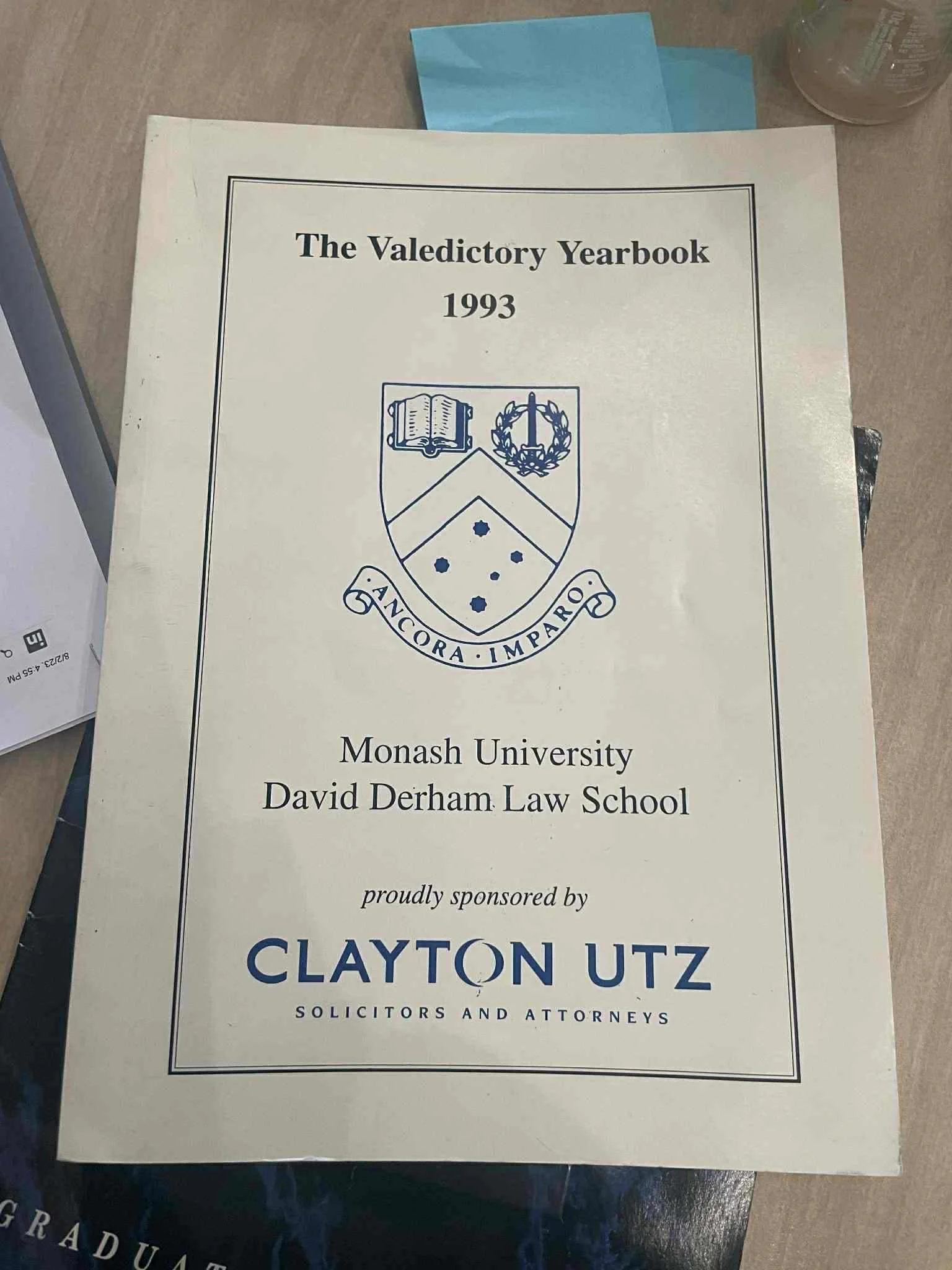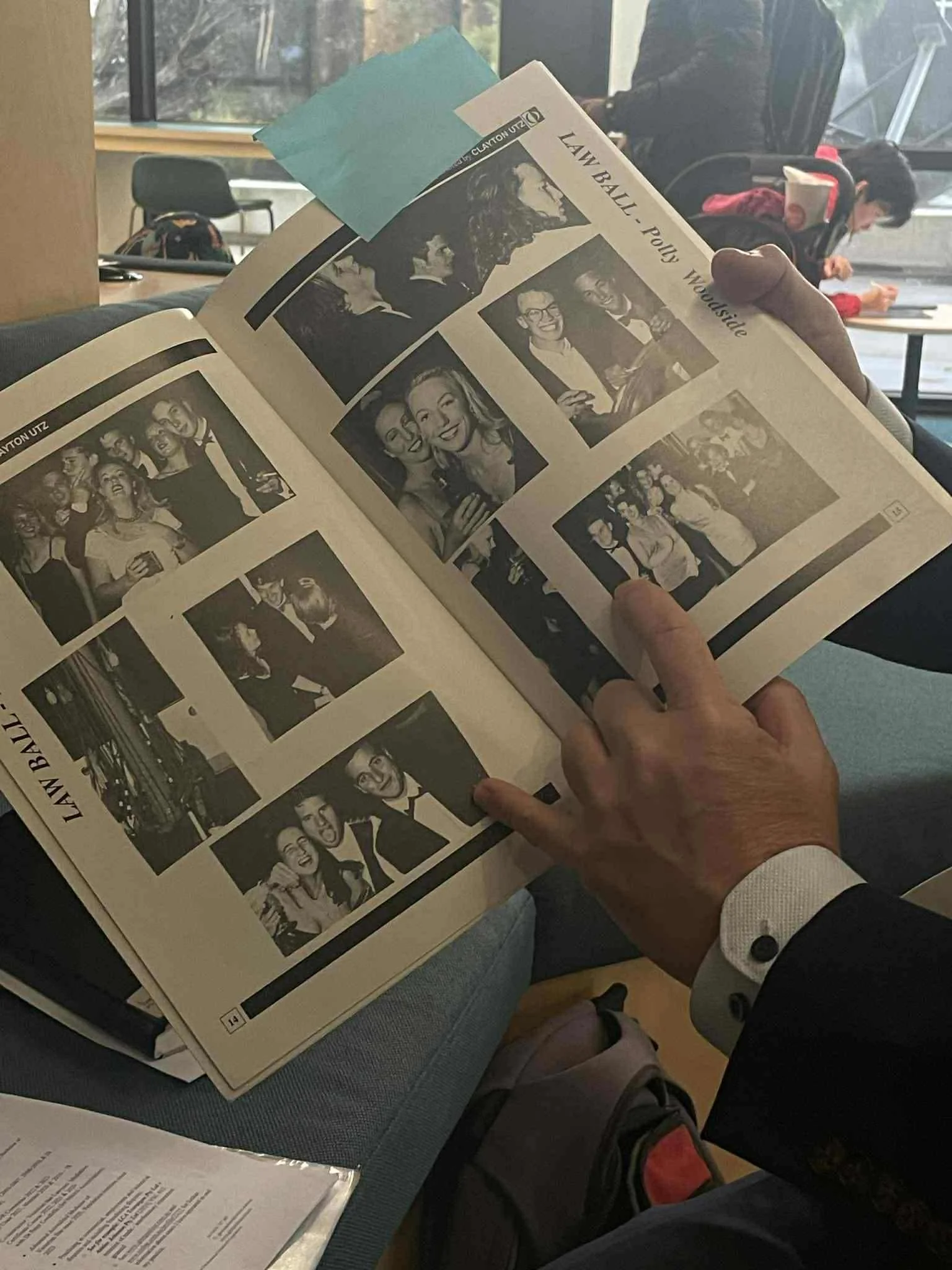The Ball’s In Your Court – A Barrister and Advanced Mediator’s Take on Navigating Career Shifts
Author: Ashleigh Cheuk
Interviewers: Ashleigh Cheuk, Eshi Ayezha & Nishara Fernando
Glen Pauline is a Barrister and Advanced Mediator at the Victorian Bar. Over the course of his legal career, he has represented clients in a wide range of areas - from employment and industrial law, to commercial disputes, franchising, and more. An expert in dispute resolution, he has successfully mediated various complex and high-stakes cases. A proud Monash alumnus, it was a full circle moment for Glen when he came down to Monash to speak with us. This sparked an afternoon of reflection and introspection, as Glen took us through his fascinating journey in the legal profession.
Chapter 1: A Trip Down The Memory Lane
Glen actually began his university journey in the Arts stream. After doing Arts for a year, he successfully transferred into Law, eventually graduating with a Law/Arts double degree. Yet, Glen’s journey in law school was not always smooth sailing. ‘I remember the first two years of law, I was sort of a credit kind of student,’ he shares candidly. ‘It took till about fourth year for it to click, and so my marks increased in my fourth and fifth year.’
For his Arts degree, Glen majored in English Literature. He found this extremely applicable to law, especially in terms of writing, reading, and understanding text. Similar to law, he had to ‘learn the vocabulary and write it in an eloquent way’.
During his time at university, Glen studied hard and took his work seriously. However, he felt that the subject matter really made a difference. He particularly enjoyed Evidence and Criminal Law, which were two subjects he excelled in. Mooting was another subject he scored well in, yet he did not think he would become a barrister at the time. ‘It was more of getting through it,’ he confesses.
Glen brought along a couple of mementos from his law school days, which certainly made it our most interactive interview yet. Showing us his transcripts, he shares, ‘It’s important to remember and celebrate the wins you have along the way. Your achievements at university are huge. You’re building your credentials, your experience; everything along the way is all building towards what you can become.’ Glen also handed us one of his assignments from law school, which was peppered with red-ink comments. ‘Everyone goes through this process of getting the red pen comments on your work. I think it’s through that process of really taking on board the criticisms and trying again that you improve,’ he reflects.
Chapter 2: Beyond The Academics
An avid tennis player to this day, it is no surprise that Glen was actively involved in Monash’s tennis club. He confesses that he was not a ‘big club guy’, only participating in several law society events in addition to his involvement in the tennis club.
For Glen, work was one of his main extracurricular activities. In his fourth year at university, he worked as a verifier for The Laws of Australia, a legal encyclopaedia. As a verifier, he was tasked with cross-checking case citations against law report volumes in the Supreme Court library. ‘That was fantastic because we got to learn all about the different citations - English, Irish, international, Australian…and understand what were authorised and non-authorised reports.’
On clerkships, Glen shares that he only did a couple. He completed a winter clerkship in his fourth year at university, and applied for more clerkships in his fifth year. All in all, he recalls doing one or two clerkships during his time in law school.
From left to right: Glen’s Valedictory Yearbook, his thesis written in his fifth year, and his photos from the Law Ball on the bottom of both pages.
Chapter 3: Starting Out
Like most other newly admitted lawyers, Glen started off as a solicitor. In the first few years of his career, he worked for a couple of mid-size firms, experiencing rotations through various departments. He eventually ended up doing local government prosecutions and work for Maddocks, particularly Food Act prosecutions. His work saw him make regular appearances in court, sparking a realisation that he did enjoy going to court. However, as he was ‘not too fussed about food prosecutions necessarily’, he felt that a pivot to criminal law might be the right move.
This led him to a new role at the Office of Public Prosecutions (OPP), where he appeared as a prosecutor in the Magistrates and County Courts. Yet, after several years at the OPP, Glen felt prompted to make another career shift. ‘I started to feel like I might want to be a barrister,’ he confesses, ‘but I knew you needed to have experiences in different areas if you wanted to go to the Bar. So I had my gap year…I went to London.’
Chapter 4: A Year In London
‘I turned up in London, had the phone number of a friend’s friend, no job, and a working holiday visa.’ Though Glen was not qualified to practise as a lawyer there, he landed a job in the London borough of Hackney, where he worked as an in-house paralegal. There, he dealt solely with property-related matters, particularly with regard to council-owned housing. With homelessness being a big problem in Hackney, there were many cases of squatters in council-owned housing. As a paralegal, his job was to prepare the case to evict these squatters, and also make an appearance in court. Glen spoke highly of his time in London, and recommends working in places other than Australia in the early stages of one’s legal career. ‘It just gives you such breadth of experience,’ he says.
Following his self-proclaimed ‘gap year’ in London, Glen returned to Melbourne, where he did two more years of commercial litigation in a small firm. Then, he decided that it was time to go to the Bar. All in all, he had six years of experience as a solicitor before becoming a barrister.
A ‘gap’ year in London.
Chapter 5: How It All Started
Glen was first called to the Bar in 2001. He shares that he had an excellent mentor with whom he worked on a few cases over the years. ‘You have to have a mentor in the law, generally, to learn from,’ he says.
‘My first five years or so at the Bar, I did a mix of criminal and civil cases. It’s a great career because you’re independent. Some days you don’t earn money, but on the days you do, it’s your money.’ As a junior barrister, he had the opportunity to get involved in a broad range of cases. Not all the cases he worked on went to trial; many were smaller cases that were heard in lower courts, the Fair Work Commission, and VCAT.
As a barrister, preparation is key. Glen shares that part of it is ‘preparing your case’, while another is ‘looking at it from the other side and preparing for the weaknesses in your own case’. He confesses that it’s perfectly normal to get nervous before a hearing as there are things you can’t control - the judge’s views on various matters, the evidence that comes up, and so on. ‘The only thing you can do is keep working on the case - you almost can’t overprepare.’ He emphasises the importance of getting everything cross-checked, and having all the necessary information at one’s fingertips.
Chapter 6: A Look Into Dispute Resolution
Glen confesses that he didn’t know much about mediation till about 10 years post-graduation. Prior to that, he had been focusing on civil and criminal cases that were taken to court. ‘I noticed that a lot of my cases were going to mediation and reconciliation. This made me wonder how the cases were being settled and what the mediator did, which got me interested in mediation.’
This spurred him to undertake a 5-day mediation course, opening his eyes to the world of dispute resolution. During the course, he was taught to place less focus on the legal case, which was merely ‘the tip of the iceberg’. More focus should instead be placed on everything else underneath, including the dynamics between parties and the circumstances that led to the dispute. Despite having completed the course, Glen knew that he still lacked the necessary experience to be a mediator. As such, he withheld any expectation of being a mediator for years.
In 2012, Glen was finally given the opportunity to work on a mediation case. Despite being rather complicated in nature, it was a good learning experience for him. Yet, even after this first case, it took him some time to receive more mediation work. It was only after getting on to the franchising mediation panel that Glen began to get a steady flow of work. This opened up doors of opportunity for him as he was then able to apply to other mediation panels, including VCAT and the Victorian Small Business Commission.
As a mediator, Glen helps parties figure out the best way to resolve their dispute. Though he finds it highly satisfying whenever he gets a settlement, his work is far from easy. In mediation, ‘you’re dealing with people who are upset, who might have trauma, who may be under financial distress…you get people in their most vulnerable moments’. Therefore, he makes it a point to treat both parties with empathy while maintaining his neutrality. Building trust is a key aspect of mediation, as is relationship-building.
Over the past 10 to 15 years, Glen has seen the mediation space grow. He believes that it will only continue to grow, as he has increasingly witnessed the unaffordability of court processes, even amongst the well-resourced.
Fast Talk with Glen:
Favourite subject? Evidence. Most disliked? Constitutional law. Plan ahead or go with the flow? An emphatic, ‘Plan ahead!’ His one-word description of his job? Always-interesting. In this Fast Talk episode, Glen reveals what makes his job rewarding (settling cases), his favourite procrastination (LinkedIn scrolling) and more.






